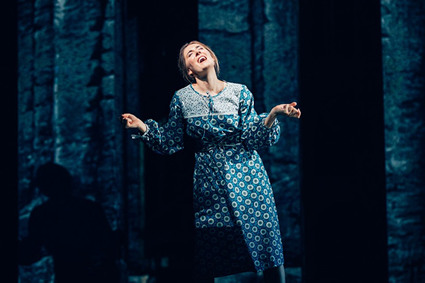| Opera Reviews | 25 April 2024 |
A ponderous new opera from Missy Mazzoliby Catriona Graham |
|
| Mazzoli: Breaking the Waves
Edinburgh International Festival 21 August 2019 |
|

Sydney Mancasola (Bess)
|
|
|
We are used to films of operas, but operas of films? That is the challenge taken on by Missy Mazzoli and her librettist Royce Vaverk in Breaking the Waves, which receives its European premiere in a Scottish Opera production at the Edinburgh International Festival, directed by Tom Morris The story – of both the opera and Lars von Trier's film – is set in an obsessively religious community in the 1970s; north-west Highlands in the film, specifically Skye in the opera. Bess, with a history of mental health issues, is marrying Jan, a foreign oil-rig worker. But what is this? The woman helping her into her wedding dress is wearing green. Green! She’s an outsider – and Bess’s sister-in-law – but surely someone has told her you never wear green at a wedding! This is not going to end well. Bess and Jan cannot wait to get their hands on each other and one feared the cistern would come off the wall, but Jan has to go back offshore. Although they have occasional phone-sex, Bess is desperate for him to come back. She cleans the church, and has got into the habit of talking to God and hearing him answer in her voice. She prays for Jan’s return, and next day he does – after an industrial accident which has paralysed him. She feels it is her fault that he is injured, so when he asks her to make love to other men and tell him about it, she remembers that wives must submit to their husbands and does so, albeit reluctantly. The doctor and sister-in-law Dodo try to convince her otherwise, to no avail. All this is delivered in predominantly conversational song. There is relatively little ensemble singing, except in the context of church, and by far the most of the singing falls to Sydney Mancasola, as Bess. Her exuberant joy in her love, her despair and pain shines through her performance in voice and gesture. Her husband Jan, sung by Duncan Rock, ironically, comes into his own after Bess has died. He has been quietly recovering, after a crisis, while she was fatally attacked. The final scene, as he gives her body to the sea, is powerfully done. Susan Bullock is strong as Mother; women, she tells her daughter, must endure, and it is clear she has done so. Without the church, she also says, we have nothing. Bess is cast out from the church – less, I think, for her sexual activities than for having raised her voice in church; see Corinthians 14:34-35. Wallis Giunta gives Dodo a fervour and enthusiasm – and a sudden outburst of power when she reminds the community that not one of them has the right to condemn Bess. The other roles are well-sung, with Freddie Tong’s Councilman suggesting a more sympathetic character behind the official black coat. Designer Soutra Gilmour’s columns, Richard Howell’s lighting and Will Duke’s projections give us the basalt cliffs, the swirling blades of the helicopter, the rust-red of a freighter, and the concrete and glass of a 1960s hospital, as well as a church, with only a revolution of the stage. The score is quite lyrical, with hints of traditional fiddle-playing and seventies rock, even if, ultimately, no-one leaves the theatre whistling a tune. Stuart Stratford conducts the Scottish Opera orchestra soloists and singers in a performance that leaves the audience pondering.
|
|
| Text © Catriona Graham Photo © James Glossop |
|







